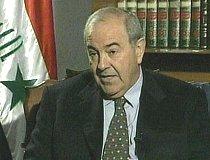Washington
18 September 2009
 |
| Ayad Allawi (file photo) |
The hearing of the House of Representatives Subcommittee on International Organizations, Human Rights and Oversight was called to examine the Chapter Seven United Nations mandate for Iraq, which was extended in August for 12 months, as well as U.S.-Iraqi agreements and their implications for the future.
However much of the questioning by lawmakers focused on the political and security conditions in the country and what they could mean for Iraq's January national elections.
Former Iraqi Prime Minister Allawi said the United States and Iraq have similar goals. The U.S. wants to leave Iraq, but not in turmoil, he said, while Iraq seeks a path of prosperity and sovereignty where individual and minority rights are respected.
But, both Allawi and parliament member Saleh al-Mutlaq pointed to political, sectarian and other problems as well as external factors, such as pressures from Iran, that could cause problems during and after the elections.
While Iraqis know the United States will be withdrawing its military forces, Allawi said Iraq's military remains unable to shoulder the security burden. And he said oustanding political and constitutional issues are also giving rise to severe tensions.
"The implementation of [the] political reform act as passed by Parliament in 2008 is a must. The act includes, among [other things] amending the Constitution, instituting an inclusive political process and implementing political and national reconciliation. None of these steps has been acted upon, yet these steps are very necessary for the stabilization of Iraq," he said.
President Barack Obama has ordered all U.S. combat forces out of Iraq by the end of August of next year, and all U.S. forces gone by the end of 2011.
Saying the United States withdrawal should be "moral and responsible," Iraqi parliament member Saleh al-Mutlaq said the only way to ensure free and fair elections in his country is with a commitment by the U.S. and United Nations for thorough monitoring.
"Without this monitoring, I believe that the election will be the same as happened before. The intimidation is already there, the assassinations are already there. And we have been getting so many warnings that we are going to be targeted, that our people are going to be targeted," he said.
Calling the elections critical, not only for Iraq's future but for the region, the subcommittee Chairman, Democratic Representative William Delahunt, said a large international observer presence is required before and during the vote.
Pointing to questions about the legitimacy of the recent election in Afghanistan, Delahunt worries not only about a deterioration in Iraq, but the impact electoral problems in Iraq could have on the American public support for U.S. policy in Afghanistan.
"If the election in January is unsuccessful, support here in this country for involvement in Afghanistan will diminish because the American people will be saying, 'We tried it once; it didn't work. And look what happened.' So this isn't just simply about supporting the Iraqi people and democracy in Iraq. It's about Afghanistan and I dare say it's about the entire region," he said.
The Democratic representative of the U.S. Congress to the United Nations, Delahunt said he will use consultations in New York next week to generate support for international monitoring of the Iraqi elections.
In his testimony to the subcommittee, Kenneth Katzman, a specialist in Middle East Affairs with the Congressional Research Service, warned that sectarianism in Iraq might worsen in the run-up to the elections. "Sectarianism, and ethnic and factional infighting continue to simmer. And many Iraqis' views and positions are colored by efforts to outflank, outmaneuver and constrain rival factions," he said.
Katzman said sectarian tensions could reach a peak as Iraqis decide whether to hold a referendum on the U.S. military presence.
On the final day of a visit to Iraq, U.S. Vice President Joe Biden said on Thursday the United States will abide by any decisions by the Iraqi people on the U.S. withdrawal schedule, part of which was established in a Status of Forces Agreement reached during the Bush administration.
In his testimony Thursday, former Iraqi Prime Minister Allawi voiced concern about what he called "reversals in security" after a fragile period of improvement, along with an upsurge in sectarian tensions.
The United States, he said, has a moral responsibility and national security interest in ensuring fraud-free elections in Iraq, which should include not only the deployment of U.S. forces, but a strong United Nations involvement.